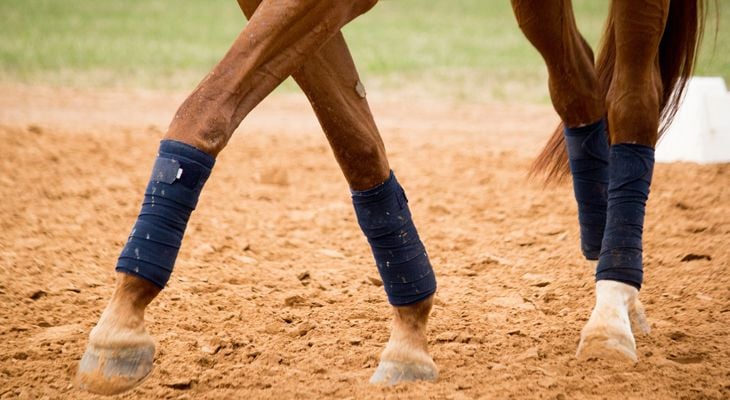
Arthritis is one of the most common conditions causing lameness in older horses; in fact, arthritis is responsible for up to 60 percent of all lameness. Arthritis can affect the knee, joint, fetlock, coffin and hock. Arthritis that affects the pastern is also known as “ringbone.”
Arthritis is the progressive and permanent deterioration of articular cartilage, a special type of cartilage that lines where bones meet at the joints. Normally, a joint is comprised of two bones that move independent of one another. Healthy articular cartilage provides a smooth surface that supports a natural range of motion and helps the joints safely absorb shocks while moving. Arthritis in horses, which may also be called osteoarthritis or degenerative joint disease, is common in both pleasure and performance horses. The increased demands of riding, training, and competing can strain a horse’s joints, exacerbating regular joint wear and tear and increasing the likelihood that a horse will develop arthritis.
Treatment
There are several treatment options available for arthritis in horses. Currently, Adequan is the only approved drug for degenerative joint disease. The drug’s ingredients travel to injured joints and stimulate new cartilage production, while also relieving arthritis symptoms. An additional approved treatment option is hyaluronate sodium injection, which treats joint dysfunction of the knee or fetlock. Non-steroidal anti-inflammatory drugs (NSAIDs) are also effective treatment options for relieving the symptoms of arthritis.
While arthritis cannot be completely prevented, it is possible to take steps that reduce or delay its development. Joint supplements, for example, support healthy, normal joint tissue. Joint supplements are most beneficial when taken prior to the onset of arthritis, although these supplements can help relieve joint pain. The highest quality joint supplements will contain glucosamine and chondroitin sulfate, two key nutrients necessary for the maintenance of normal joint function. Natural vitamin E supplements are also beneficial for supporting a strong, healthy immune system.
Other options for reducing the risk of arthritis in horses include keeping your horse at a healthy weight, keeping your horse’s feet properly trimmed, and keeping your horse moving. Be sure to warm up and stretch your horse before exercising, incorporate passive, range of motion exercises into your horse’s daily schedule, and monitor the footing when turning out and riding. Regular wellness screenings from your equine veterinarian will help ensure your horse remains healthy and active, and allow you to proactively take steps to protect your horse’s long-term health as it ages.
Source:
Kellon, Eleanor, VMD. “Managing Arthritis in Your Horse.” Equisearch. 2014.


